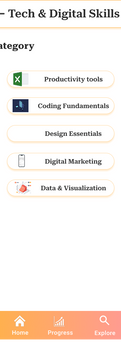
SKILLSIP – Mobile App Design
Duration: 1 Month | Tools Used: Figma | Role: UX/UI Designer

Overview
SKILLSIP is a thoughtfully designed micro-learning mobile app that delivers daily 5-minute lessons across a variety of skill categories including Cooking, Language, Personal Finance, Fitness, Tech, and Digital Skills. The idea behind the app is to make continuous learning easy, accessible, and sustainable — especially for busy individuals who struggle to find time for long-format courses.
Design Goal
The goal was to create an engaging platform where users could build skills in small, consistent doses. The design encourages habit formation through bite-sized lessons, progress tracking, and a friendly, distraction-free interface.
My Process
User Research
Conducted interviews and competitive analysis to understand user behaviors, motivations, and pain points around learning in short time windows.
Wireframing & UI Design
Created low-fidelity wireframes to map user flows, followed by high-fidelity designs in Figma focusing on clarity, minimalism, and ease of navigation.
Focus Areas
-
Clean and minimal UI to support focused learning
-
Easy onboarding to introduce the concept clearly
-
Daily reminders and progress tracking to encourage habit formation
-
Modular structure of skill categories for scalability
Prototyping & Testing
Built an interactive prototype and tested it with a small group of users. Feedback was used to improve the onboarding flow, lesson interface, and progress tracking experience.

Outcome

The final design offers a smooth and intuitive user experience that motivates users to return daily. SKILLSIP transforms micro-learning into a sustainable habit by keeping learning light, structured, and enjoyable — one small step at a time.
Key Learnings
User Habits Matter
I learned how important it is to align design decisions with real user behavior, especially when working with daily-use apps. Even small friction can disrupt habit formation.
Balancing Simplicity with Functionality
Designing a minimal interface while still offering variety in skill categories helped me understand how to prioritize content without overwhelming the user.
Iterative Design is Powerful
User feedback significantly improved the flow of the app. Simple tweaks — like changing button labels or reducing onboarding steps — made a noticeable difference.
Designing for Motivation
I explored how UI elements like streaks, progress indicators, and completion messages can influence user motivation positively.
Future Enhancements
Gamification
Adding badges, levels, and achievements to reward consistent learners and boost motivation.
Community Feature
Enable peer learning through discussions, shared progress, and collaborative challenges.
Personalized Learning Paths
Allow users to choose goals and receive customized lesson suggestions based on their interests or skill gaps.
Dark Mode
To enhance accessibility and cater to user preferences for low-light environments.
















